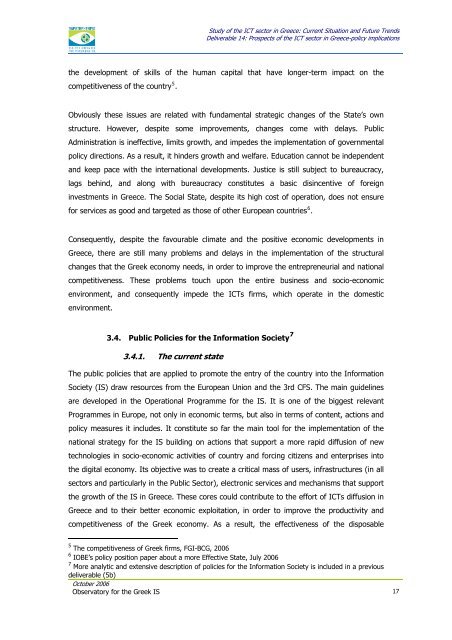Prospects of the ICT sector in Greece
Prospects of the ICT sector in Greece
Prospects of the ICT sector in Greece
- No tags were found...
You also want an ePaper? Increase the reach of your titles
YUMPU automatically turns print PDFs into web optimized ePapers that Google loves.
Study <strong>of</strong> <strong>the</strong> <strong>ICT</strong> <strong>sector</strong> <strong>in</strong> <strong>Greece</strong>: Current Situation and Future Trends<br />
Deliverable 14: <strong>Prospects</strong> <strong>of</strong> <strong>the</strong> <strong>ICT</strong> <strong>sector</strong> <strong>in</strong> <strong>Greece</strong>-policy implications<br />
<strong>the</strong> development <strong>of</strong> skills <strong>of</strong> <strong>the</strong> human capital that have longer-term impact on <strong>the</strong><br />
competitiveness <strong>of</strong> <strong>the</strong> country 5 .<br />
Obviously <strong>the</strong>se issues are related with fundamental strategic changes <strong>of</strong> <strong>the</strong> State’s own<br />
structure. However, despite some improvements, changes come with delays. Public<br />
Adm<strong>in</strong>istration is <strong>in</strong>effective, limits growth, and impedes <strong>the</strong> implementation <strong>of</strong> governmental<br />
policy directions. As a result, it h<strong>in</strong>ders growth and welfare. Education cannot be <strong>in</strong>dependent<br />
and keep pace with <strong>the</strong> <strong>in</strong>ternational developments. Justice is still subject to bureaucracy,<br />
lags beh<strong>in</strong>d, and along with bureaucracy constitutes a basic dis<strong>in</strong>centive <strong>of</strong> foreign<br />
<strong>in</strong>vestments <strong>in</strong> <strong>Greece</strong>. The Social State, despite its high cost <strong>of</strong> operation, does not ensure<br />
for services as good and targeted as those <strong>of</strong> o<strong>the</strong>r European countries 6 .<br />
Consequently, despite <strong>the</strong> favourable climate and <strong>the</strong> positive economic developments <strong>in</strong><br />
<strong>Greece</strong>, <strong>the</strong>re are still many problems and delays <strong>in</strong> <strong>the</strong> implementation <strong>of</strong> <strong>the</strong> structural<br />
changes that <strong>the</strong> Greek economy needs, <strong>in</strong> order to improve <strong>the</strong> entrepreneurial and national<br />
competitiveness. These problems touch upon <strong>the</strong> entire bus<strong>in</strong>ess and socio-economic<br />
environment, and consequently impede <strong>the</strong> <strong>ICT</strong>s firms, which operate <strong>in</strong> <strong>the</strong> domestic<br />
environment.<br />
3.4. Public Policies for <strong>the</strong> Information Society 7<br />
3.4.1. The current state<br />
The public policies that are applied to promote <strong>the</strong> entry <strong>of</strong> <strong>the</strong> country <strong>in</strong>to <strong>the</strong> Information<br />
Society (IS) draw resources from <strong>the</strong> European Union and <strong>the</strong> 3rd CFS. The ma<strong>in</strong> guidel<strong>in</strong>es<br />
are developed <strong>in</strong> <strong>the</strong> Operational Programme for <strong>the</strong> IS. It is one <strong>of</strong> <strong>the</strong> biggest relevant<br />
Programmes <strong>in</strong> Europe, not only <strong>in</strong> economic terms, but also <strong>in</strong> terms <strong>of</strong> content, actions and<br />
policy measures it <strong>in</strong>cludes. It constitute so far <strong>the</strong> ma<strong>in</strong> tool for <strong>the</strong> implementation <strong>of</strong> <strong>the</strong><br />
national strategy for <strong>the</strong> IS build<strong>in</strong>g on actions that support a more rapid diffusion <strong>of</strong> new<br />
technologies <strong>in</strong> socio-economic activities <strong>of</strong> country and forc<strong>in</strong>g citizens and enterprises <strong>in</strong>to<br />
<strong>the</strong> digital economy. Its objective was to create a critical mass <strong>of</strong> users, <strong>in</strong>frastructures (<strong>in</strong> all<br />
<strong>sector</strong>s and particularly <strong>in</strong> <strong>the</strong> Public Sector), electronic services and mechanisms that support<br />
<strong>the</strong> growth <strong>of</strong> <strong>the</strong> IS <strong>in</strong> <strong>Greece</strong>. These cores could contribute to <strong>the</strong> effort <strong>of</strong> <strong>ICT</strong>s diffusion <strong>in</strong><br />
<strong>Greece</strong> and to <strong>the</strong>ir better economic exploitation, <strong>in</strong> order to improve <strong>the</strong> productivity and<br />
competitiveness <strong>of</strong> <strong>the</strong> Greek economy. As a result, <strong>the</strong> effectiveness <strong>of</strong> <strong>the</strong> disposable<br />
5 The competitiveness <strong>of</strong> Greek firms, FGI-BCG, 2006<br />
6 IOBE’s policy position paper about a more Effective State, July 2006<br />
7 More analytic and extensive description <strong>of</strong> policies for <strong>the</strong> Information Society is <strong>in</strong>cluded <strong>in</strong> a previous<br />
deliverable (5b)<br />
October 2006<br />
Observatory for <strong>the</strong> Greek IS 17
















